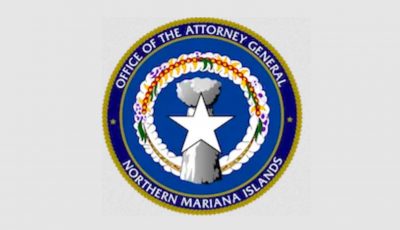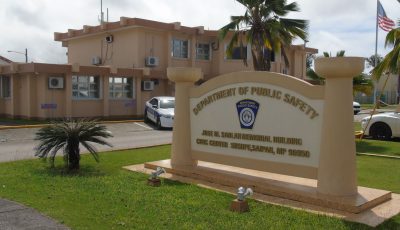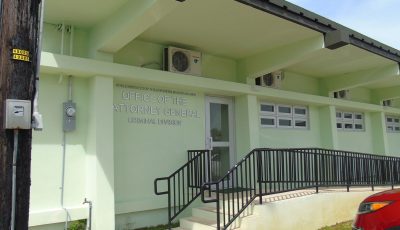Baisley: OAG wrongly blamed for delay
Former assistant attorney general Matthew C. Baisley is disappointed with the CNMI Supreme Court’s ruling in the case against former Department of Public Safety commissioner James C. Deleon Guerrero and former police officer Jesse Salas Concepcion, raising questions why it took the high court over two years to resolve the issue.
“Really the most disappointing thing about the opinion is how long it took to issue,” said Baisley, who used to handle the case and argued the case before the high court. He is now an associate at the BakerHostetler law firm in Denver.
In its opinion last Thursday, the CNMI Supreme Court denied the government’s petition to order the Superior Court to reinstate the charge of sexual abuse of a minor in the first degree against Deleon Guerrero and Concepcion.
The high court also denied the government’s request for the justices to order Superior Court Presiding Judge Roberto C. Naraja to recuse Associate Judge Joseph N. Camacho from the case.
In the high court’s decision, the justices said they find Camacho’s determination to be logical.
Justice pro tem F. Philip Carbullido issued the opinion. Associate Justice John A. Manglona and Justice pro tem Timothy H. Bellas concurred with the ruling.
Camacho presided over the case. In 2016, he dismissed without prejudice the charges against Deleon Guerrero and Concepcion. That means the OAG may re-file the charges.
Camacho found no probable cause as to the charges of conspiracy to commit sexual abuse of a minor in the first degree as the government has produced no evidence that Deleon Guerrero and Concepcion conspired to have sex with a minor.
Camacho also found no probable cause for the two counts of misconduct in public office as the government presented no evidence that the alleged offense occurred.
The judge also dismissed without prejudice the charges of sexual abuse of a minor in the first degree filed each against Deleon Guerrero and Concepcion. He said the government failed to prove essential elements of the offense.
With Camacho’s ruling, the government then filed a petition for a writ of mandamus before the CNMI Supreme Court.
In his response to Saipan Tribune’s request for comments yesterday, Baisley said this was a petition for a writ of mandamus and that the CNMI Supreme Court’s own rules state that such petitions are to take precedence over other matters.
He said the high court issued approximately 32 rulings before it issued this one.
Baisley recalled that the Office of the Attorney General filed the original petition in June 2016 and the high court issued its opinion only last Thursday.
“A two-plus year delay is hard to understand,” said Baisley, adding that the legal issue was novel, but it was based on precious few cases.
He said in the high court’s primary reasoning in this case, the justices analyzed one statute, compared the one statute with one other statute, and they analyzed the four cases. “That is an extremely limited legal landscape and so I’m not sure why it took over two years,” the former prosecutor said.
In the meantime, he said, the community has had to wonder what the status of the prosecution of this serious alleged crime was.
Baisley said the OAG was wrongly blamed by many for the delay and that it was in a holding pattern until the high court decided last week.
The OAG is now in the unenviable position of having to evaluate its case two years later, he said. “It is well-understood in the legal profession that cases get harder and harder to prosecute the more time that goes by,” he pointed out.
In terms of the opinion’s substance, Baisley believes the high court got it wrong. He said he was disappointed that the Supreme Court did not really contend with the OAG’s arguments.
“Typically, in novel cases you see courts describe the arguments they are addressing and then specifically walk through those arguments and why they are incorrect. That was not done here,” Baisley noted.
He said there are many examples, but by just reading the high court’s opinion, they can see that the justices pretty much assert their opinion without contending specifically with the Commonwealth’s contrary position.
“Anyway, it’s too bad, but reasonable minds can always disagree regarding novel legal questions, and this was a legal question without any prior specific authority in any jurisdiction in the United States,” he said.
In other words, Baisley said, the high court had to decide for the first time what the law is, and that is a challenging endeavor.
“I have a lot of respect for the CNMI’s Supreme Court, and, apart from the delay which hopefully has some compelling justification, I know they gave this important issue their best shot,” he said.
Baisley said he is proud of the OAG for not shying away from novel legal questions, even ones with no precedent in any American jurisdiction.
The former prosecutor said some will of course complain and accuse the OAG of not handling the case properly, but he contends that the OAG chose the morally courageous approach here.
He said even if the high court ultimately sided against it, he wishes the OAG all the best in tackling the difficult decision of how to proceed now, two years later.



























